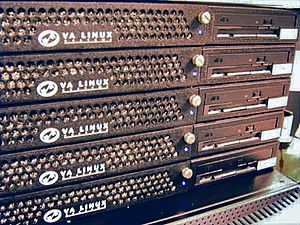Server facts for kids
Imagine a helpful computer that gives information to many other computers. This special computer is called a server. It's like a central hub that stores files, websites, and other data. When your computer, which is called a client, needs something, it asks the server. The server then "serves" that information back to your computer.
For example, when you visit Wikipedia, your computer (the client) asks Wikipedia's web servers for a page. The server then sends that page to your screen. Servers can also host online games, help you share files, or even let many people use the same printer.
To talk to each other, servers and clients need to be connected on a network. They also use a special "language" called a communication protocol. This is a set of rules that helps computers understand each other. For instance, when you browse the internet, computers use the HTTP to send and receive web pages.
What Makes Servers Special?
Servers are usually built to be very strong and dependable. They are often more powerful than regular computers. This helps them handle many requests at once. Because they are so powerful and reliable, servers can be more expensive than the computers we use every day.
Sometimes, many servers work together as a group. This is called a "cluster." It helps them share the work and makes sure services are always available.
If too many people try to access a server at the same time, it can slow down. This is like a busy store with too many customers. A server that is too busy might even shut down to protect itself.
Servers often don't have a screen, keyboard, or mouse. People usually control them from another computer. Common operating systems for servers include Linux, FreeBSD, and OpenBSD.
Web Servers
A web server is a type of server that stores and delivers websites. When you type a website address into your browser, a web server sends you the pages you want to see.
Popular programs that act as web servers include Apache and IIS. One web server can host just one website or many different ones.
Web servers use special "ports" to listen for requests. Port 80 is usually for regular web pages (HTTP). Port 443 is for secure web pages (HTTPS), which keep your information private.
Some web servers can do more than just send web pages. They can also run special programs that create web pages on the fly. These programs can be written in languages like Perl, Python, PHP, C++, or Java.
Related pages
 | Chris Smalls |
 | Fred Hampton |
 | Ralph Abernathy |


